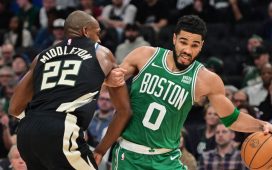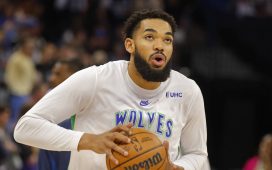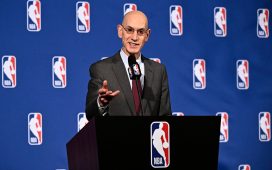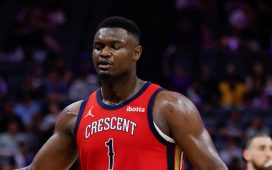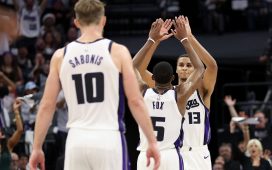When Wes Unseld, Sr.’s mother, Cornelia, died in 1989, I’m pretty sure we were in Charlotte, where the Bullets, the team Wes coached and I covered, were going to play the Hornets. Cornelia Unseld worked in a school cafeteria, Unseld’s father, Charles, had worked for International Harvester in construction. He taught his son the trade of building — laying brick and mortar, the tough work of honest men. At home outside of Louisville, Ky., Wes would throw hay bales up to his dad, dozens at a time, as part of his chores. Like Daniel learning from Miyagi in The Karate Kid, Wes had no idea the work his father had him doing would make him, perhaps, the strongest man in the NBA for a decade, even though he never lifted a weight.
But he did not feel strong that day in Charlotte.
“I feel like an orphan,” he said, quietly, his father having passed away years earlier.
It was such a poignant, vulnerable thing for a man so strong and so feared and so respected to say — and especially to me, a kid reporter, in the doorway of the Charlotte Airport Marriott. But it was so in character for him.
He was the greatest player in the history of the Bullets/Wizards franchise. And when I think of today’s NBA, I think about men like Wes, who gave the game so much and upon whose shoulders today’s players and coaches and executives stand. And it angers me that someone like Wes would have likely struggled to find a champion among today’s decision-makers. He didn’t score much. He didn’t shoot the ball especially well. But he could, and did, dominate games. The NBA was built on the play of big men like him. And those big men, today, don’t seem to be viewed as having much to offer.
He was the most honest man I knew in 30 years of covering the league. In the five years I covered the then-Bullets for The Washington Post, he never lied to me. When he moved up to GM afterward, he never lied to me. When I’d call him just to catch up, many years later, he never lied to me. If I asked him what he thought of one of his players, he’d tell me. If I had information, such as a pending trade the team was working on, and it was accurate, he’d confirm it. If it wasn’t, he wouldn’t let me hang myself.
The last time I spoke with him, in 2018, he didn’t lie to me. That year was the 40th anniversary of the franchise’s only NBA title, in 1978, when the Bullets beat the Seattle SuperSonics in seven games. Washington became the first team since Bill Russell’s Celtics to win a Game 7 of the Finals on the road. That finally got Unseld, who’d been drafted No. 2 overall in 1968 out of the University of Louisville when the franchise was in Baltimore, his first NBA championship after losing in the Finals in 1971 and 1975.
But Wes did so much more than man the middle on the court. He was the one who organized the team’s Christmas parties, at his house. And for almost 40 years, he, his wife Connie and their daughter Kim were the foundational pieces that made The Unselds’ School, a PreK-8 private school that has taught generations of kids in Baltimore. Connie, an educator who’d taught in the city’s public schools beforehand, was and remains the principal; Kim teaches a variety of classes. (Their son, Wes Unseld, Jr., one of the first students at their school, graduated from Johns Hopkins and is now an assistant coach with the Nuggets, and is an up-and-coming head coach candidate.)
Big Wes was known for greeting the students as they entered, and as they left at the end of the day.
“The first thing that comes to mind is that he was as kind as he was large in stature,” said Phil Chenier, Unseld’s teammate through most of the ’70s and one of the best shooting guards of that era.
“His greatness (as a player) obviously is there,” said Chenier, who worked for decades after retiring as the team’s broadcast analyst. “I remember the first day I came into camp (in 1971), over at Fort Meade. I came in late, because this is the year they had the hardship (the earliest form of allowing basketball players to leave college early for the draft), and they also had the supplemental draft. And by the time they negotiated (his contract), I came into camp with about five days to go. I had just watched them play in the Finals a few months before against Milwaukee, and here I am coming in. I come to the gym. I see Jack Marin, and Freddy (Carter), and I see Wes. I had met him before; I was on this makeshift team that had played against them out in the Bay. I just remember him always being kind to people. Even though he had that scowl, just the most pleasant person to be around. During times of real tension and pressure, I think everybody kind of looked to him as a calming effect. He always had this picture of strength, unflappable. And you drew this strength and calmness from him.”
In 1978, Unseld had to calm himself down. With the help of newly acquired Bobby Dandridge at small forward, the Bullets had upset the heavily-favored 76ers in the Eastern Conference finals. In the Finals, they’d face the equally surprising Sonics. The great Portland team led by Bill Walton had won the title in ’77, and was the prohibitive favorite to repeat the following season. The Blazers started that year with a 50-8 record, but Walton got hurt down the stretch of the regular season, and Portland faded; Seattle beat the Blazers in the Western semis, then beat Denver to advance to the Finals. The Bullets had been a dominant team throughout the decade, but hadn’t won the championship, and Unseld was running out of time.
In Game 7, the Bullets led by two with 12 seconds left when Seattle deliberately fouled Unseld — a pretty poor free throw shooter. In those days, if a team over the foul limit took a foul in the backcourt to stop the clock, as Seattle had with Unseld, the shooter got three free throw attempts: known back then by the shorthand “three to make two.”
Four decades later, I asked him what he was thinking as he stepped to the line.
“I was thinking I didn’t want to be there,” he said.
So, great players get spooked, too?
“Well, if great players tell the truth,” he said.
He missed the first free throw, but made the second and third, and seconds later, Unseld having grabbed the last rebound, Washington had its first, and only, NBA championship. Unseld was named Finals MVP.

Wes Unseld boxes out Jack Sikma of Seattle. The Bullets beat the Sonics to win the 1978 NBA title. (NBAE via Getty Images)
“All I could think of going through it was this was my last shot,” he said in 2018. “That was the only thing that I remember about The Finals. And the person I expressed it to — probably wore the man out — was Frank Herzog (the radio play-by-play man back then). I’m sure Frank got tired as hell of me. We had dinner together, would hang out together. That was the only thing I think I thought about. I wasn’t down about the things that I’d accomplished, but I just wanted to get over the hump that time.”
It was the ultimate for Unseld, one of only two men in NBA history — the other being Wilt Chamberlain — to win both NBA Most Valuable Player and Rookie of the Year awards in the same season. For most of his career in Baltimore and Washington, the Bullets were championship contenders, making four Finals in eight years. Teaming with fellow Hall-of-Famer Elvin Hayes, acquired from Houston, Unseld and Hayes became one of the league’s feared frontcourts, physical and unrelenting. Wes and the Big E had a love-hate relationship through their playing days together, but grew closer after their retirements.
Stoic on the floor, Unseld was known for setting brutal picks and for the best outlet pass in NBA history — a seeming flick of his two wrists, the ball hidden somewhere in his massive hands, then coming out on a parabola 50, 60 feet downcourt, starting the Bullets on the fast break.
Wes was known for being able to grab a rebound and, before hitting the ground, turn and fire the basketball all the way downcourt, hitting the opposite backboard. I saw him do it in practice. But he dismissed it as “a bar trick.” It was a trick no one else could do, though.
One day as a practice was winding down, we were talking on the court. Wes was still massive: in those days, he was probably 250, 260. But he still only stood 6-foot-6 or so. I said to him: ‘Wes, no disrespect. But how did you guard Kareem, or Wilt? They were six or seven inches taller, and weighed just as much.’ Chamberlain, like Wes, was also known for being freakishly strong; Kareem was so agile, being an early practitioner of yoga.
He said, ‘come over here.’ I walked to where he was, on the block. At the time, being a beat writer whose diet consisted of booze, airport gift shop snacks and postgame burgers, I was a balloon, but a heavy one. He put his left hand on my right hip.
“Move,” he said.
But, I couldn’t. He just … guided me around the floor.
I saw something similar years later, when the Bad Boy Pistons played the Bullets in a game in Baltimore. Dennis Rodman had goaded Darrell Walker into a fight; as the teams scuffled with one another on the floor, Wes rose, slowly, off his seat on the bench, walked onto the court, grabbed Bill Laimbeer by the front of his jersey and just flicked him — all 270 pounds or so of him — under the tables on press row, where I was seated. Laimbeer did not seek out Unseld for a second round.
“I enjoyed playing for Wes Unseld,” Walker said Tuesday. “I just talked with Connie and she said, ‘you were his favorite player.’”
Indeed, Wes loved Walker, a feisty point guard who’d come from the Knicks, who couldn’t shoot that well, but guarded the hell out of people and hit the glass hard — he led the Bullets in rebounding in 1990. And Walker, now the head coach at Arkansas-Little Rock, often saw first-hand how Unseld suffered no fools.
“We’re playing in the old Chicago Stadium,” Walker said. “It’s halftime. Wes at the blackboard, smoking a cigarette, telling us what to do. He said something to Manute (Bol) — rebound, block a shot, or something. And Manute caught an attitude — ‘I don’t want to hear that shit.’ Wes said, ‘what the hell did you say?’ Manute jumped up, Wes jumped up, and it took the whole team to hold Wes back. I went to Manute and said, ‘have you lost your fucking mind? Sit your ass down. Wes is getting ready to break you in two, man.’ He didn’t play that stuff.”
In hotel restaurants, seated at the bar, on planes, on the phone (“what do you want, Aldridge?” he’d ask, gruffly), in locker rooms, Wes gave graduate school-level information about the NBA: not just the game, but the people. Who you could trust, and who was full of it. As a coach, he’d say, you treat all of your players equally, but you don’t treat them the same. Translation: stars had leeway that others didn’t, but the other guys had to feel like there was still an overall structure in place that was fair to them. His teams played like he did: underskilled compared with the league’s elite at the time, the Celtics and Lakers and Pistons, they’d fight and scrap and play so damn hard. But injuries and the aforementioned lack of talent doomed the Bullets to terrible, horrible, no-good seasons.
It was hard for a man as prideful and as successful as Wes. But even in defeat, he taught lessons about not making excuses, and playing with pride, and being mentally tough. He ran brutal training camps, long on running — and woe to the player who came to camp out of shape. There was a lot of leaning into trash baskets soon afterward, if you get what I’m saying.
He was extremely close to Abe Pollin, the late owner of the team. They negotiated Wes’s contracts alone, with no agent, year after year. Pollin was amazingly, ridiculously loyal to people he’d brought into the organization; in all honesty, he kept Wes and others around a lot longer than most others would have. People would work for decades with the Bullets, well into the Wizards era. Even when Michael Jordan came to town, Wes remained in the general manager’s seat until he was good and ready to leave.
It was hard watching him the last few years. A series of physical ailments wore him down, surgery after surgery. He gained and lost weight with alarming swiftness. But he was so proud. Very few people were able to see him, and no one was in the last months, as he was at a nursing facility, unable to have visitors because of COVID-19. The hope was he’d be able to move back into his house soon. It is better for me not to think of these last years, but as I will remember him: standing tall on the Bullets’ sideline, blocking the view of both myself and the radio guy, Charlie Slowes — now the Nationals’ radio play-by-play man — calling out sets, turning to us during breaks in play, a wry smile on his face, a good man who was good to so many others.
(Top photo: Jerry Wachter / NBAE via Getty Images)

